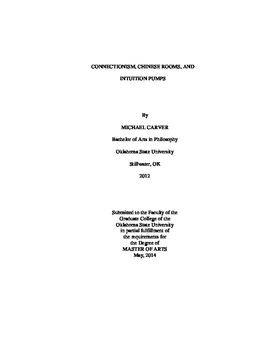| dc.contributor.advisor | Cain, James | |
| dc.contributor.author | Carver, Michael | |
| dc.date.accessioned | 2015-06-17T20:05:10Z | |
| dc.date.available | 2015-06-17T20:05:10Z | |
| dc.date.issued | 2014-05-01 | |
| dc.identifier.uri | https://hdl.handle.net/11244/14757 | |
| dc.description.abstract | John Searle's famous Chinese Room argument is perhaps the most well-known attack on computational views of mind. At the center of this argument is a thought experiment in which the reader (thinker) is lead to an intuition that computational models of mind are deeply flawed due to their syntactic (or formal) nature. In this paper, I argue that the resulting intuition of this thought experiment is dampened when the `Classical' program contained in the original thought experiment is replaced with a `Connectionist' program. The resulting thought experiment - The Korean Room - helps show that the intuitive results of Searle's `intuition pump' can change as a result of relatively small changes in what we're asked to imagine. | |
| dc.format | application/pdf | |
| dc.language | en_US | |
| dc.publisher | Oklahoma State University | |
| dc.rights | Copyright is held by the author who has granted the Oklahoma State University Library the non-exclusive right to share this material in its institutional repository. Contact Digital Library Services at lib-dls@okstate.edu or 405-744-9161 for the permission policy on the use, reproduction or distribution of this material. | |
| dc.title | Connectionism, Chinese Rooms, and Intuition Pumps | |
| dc.type | text | |
| dc.contributor.committeeMember | Recker, Doren | |
| dc.contributor.committeeMember | Spaulding, Shannon | |
| osu.filename | Carver_okstate_0664M_13325.pdf | |
| osu.accesstype | Open Access | |
| dc.description.department | Philosophy | |
| dc.type.genre | Thesis | |
| dc.subject.keywords | artificial intelligence | |
| dc.subject.keywords | chinese room | |
| dc.subject.keywords | computational theory of mind | |
| dc.subject.keywords | connectionism | |
| dc.subject.keywords | john searle | |
| dc.subject.keywords | thought experiment | |
